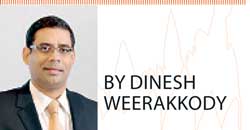27 Dec 2017 - {{hitsCtrl.values.hits}}

 The new economy has greatly changed our economic environment in relation to how the government and businesses operate and provide goods and services and the structure of the labour force. Prosperity in the new economy involves more than capitalizing on knowledge assets.
The new economy has greatly changed our economic environment in relation to how the government and businesses operate and provide goods and services and the structure of the labour force. Prosperity in the new economy involves more than capitalizing on knowledge assets.
Prosperity involves increasing employment in those industries that are growing. Digital payments, digital data, digital customer service, payments through new platforms, along with real-time analytics are becoming entrenched in the world economy. These elements will forever change the consumption form because of the effects of many governments’ push towards a cashless economy.
Little over a year ago, India, in an effort to move to and combat corruption, tax evasion and counterfeiting, withdrew all Rs.500 and Rs.1,000 banknotes from circulation. Many international bankers argue that India failed miserably in its demonetization effort.
The Modi government publicly declared the demonetization objectives were to transform the economy into a digital economy. We know we can’t completely transform an economy to a digital economy overnight. There are various social classes. For example, a waiter or steward receive tips, a household worker gets some extra money for a job well done, parliamentarians get political funds, even some professionals have foundations to earn their donations and sales from books, parliamentarians or politicians have their own foundations established to get donations and then politicians partly use those money to uplift certain communities, even clergy use money they receive to uplift social standards of communities and to look into the welfare of them.
If you take an establishment such as the Roman Catholic Church, it has over US $ 60 billion real estate assets around the globe in the name of church lands, missionary schools, etc. that were purchased from the money that they got from devotees, which went to clergy and The Vatican.
Just imagine what happens if the citizen Fernando has to donate money by a mobile app that sometimes is not even properly working to transfer money to a temple, kovil or church or even a mosque, etc? There will be hell to pay all round.
Demonetization
In the Indian demonetization effort, if the real objective was to attack the ‘black money’ stored by the political and business elite, it has failed. Around 90 percent of the demonetized notes were returned to the banks, far more than the government expected; this means, as the Guardian explained, with its sense of British understatement: “either the Indians concealed less wealth from taxation than was thought or that money has been preserved in the form of goods or gold rather than cash.”
In fact, according to economists, probably less than 3 percent of black money is held in currency. In an Indian context, it is still big money. Almost all of it is either converted into gold (it is said India has by far the largest private gold reserves in the world) or put into purchases of jewellery, real estate or land, when it isn’t put into financial investments.
And then, when all that money goes into their bank accounts or other establishments, that money too comes to the so-called ‘White’ system ... gambling (casinos) is said to be one of the world’s biggest industries that creates wealth among various social classes and there are gambling moguls around the world who own banks, finance companies, real estate; even in the USA there are poker players who become rich overnight and then their wealth is transferred into various other establishments when they start using that money. One such example is a spa owner. His extra earnings transform to various other business establishments when they purchase goods and services.
Drive away
A full digital economy can drive away lots of people and perhaps increase the poverty, if the digital transformation is done by creating limitations and wealth limits. Although India implemented practices of demonetization, if you watched NDTV and other TV news, listened to Indian radio last few months, you will clearly understand that certain new gray economic activities started as a result of the moves.
There were Indian banker families or officials, new brokers who started taking thousands of Indian rupees worth kick-backs from common people to deposit the money under various other names and newly created accounts in India as there were new taxes for deposit limits.
Many people faced identity theft as a result too; India being the world’s largest democracy has the most business-savvy politicians but even they are people who transform wealth to various other businesses and religious and social establishments.
Mass adoption
Several top economists have said what India did was a failure and it only hugely troubled the poor families and specially the older people’s savings. India is the largest gold consumer and India’s activity in impacting global gold prices took a different turn because of demonetization.
It enabled the digital currencies such as bitcoin to overtake the gold price in international markets in the last three months and even if you take bitcoin, people trade in those digital currencies and their capital gains are transformed to other asset classes in the real world, finally resulting in the real economy losing.
Banks and companies will need to work with each other dynamically along with using digital payments. They can help many small and medium enterprises (SMEs) with digital payments and to crunch stock keeping data over the cloud. This can enable SMEs to raise working capital loans from banks and the country which can benefit from going digital.
Every a businessman has a smartphone and only needs technology to be proliferated through marketing. The problem is discovery today. The next three years will see a mass adoption of digital technologies. However, though digital technologies are spreading across the globe, many people in the country still do not have access to the Internet.
(Dinesh Weerakkody is a thought leader)
10 Jan 2025 20 minute ago
10 Jan 2025 1 hours ago
10 Jan 2025 2 hours ago
10 Jan 2025 4 hours ago
10 Jan 2025 4 hours ago